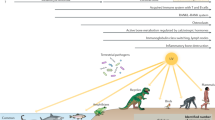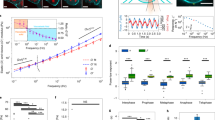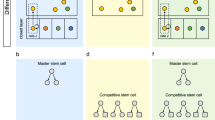Abstract
INCREASING the calcium concentration in the environment of various types of isolated mammalian and insect cells hastens their progress through mitosis and also counteracts the transient mitotic inhibition following irradiation1–6. The same effects can be produced in the bone marrow and thymus of the whole animal by raising the blood calcium either directly, by injecting calcium salts, or indirectly through the action of parathyroid hormone7,8. Conversely, lowering the calcium level in the medium of isolated normal or irradiated cells reduces their rate of flow into mitosis6. Reducing the total calcium level in the blood by injecting the chelating compound ethylene diamine tetra-acetic acid (EDTA) or inorganic phosphate should therefore reduce the mitotic activity in normal and irradiated marrow and thymus in vivo. Contrary to expectations, the present study shows that these compounds in fact stimulated mitosis.
This is a preview of subscription content, access via your institution
Access options
Subscribe to this journal
Receive 51 print issues and online access
$199.00 per year
only $3.90 per issue
Buy this article
- Purchase on Springer Link
- Instant access to full article PDF
Prices may be subject to local taxes which are calculated during checkout
Similar content being viewed by others
References
Gaulden, M. E., in Mitogenesis (edit. by Ducoff, H. S., and Ehret, C. F.), 35, 43, 44 (The University of Chicago Press, Chicago, 1959).
Carlson, J. G., and Gaulden, M. E., in The Initial Effects of Ionising Radiation on Cells (edit. by Harris, R. J. C.), 210 (Academic Press, New York, 1961).
Amand, G. A. St., Anderson, N. G., and Gaulden, M. E., Exp. Cell Res., 20, 71 (1966).
Whitfield, J. F., Brohée, H., and Youdale, T., Exp. Cell Res., 41, 49 (1966).
Whitfield, J. F., and Rixon, R. H., Exp. Cell Res., 27, 154 (1962).
Whitfield, J. F., and Youdale, T., Exp. Cell Res., 43, 602 (1966).
Perris, A. D., and Whitfield, J. F., Nature, 214, 302 (1967).
Perris, A. D., Whitfield, J. F., and Rixon, R. H., Radiat. Res. (in the press).
Bertalanffy, F., and Lau, C., Intern. Rev. Cytol., 13, 357 (1962).
Copp, D. H., Cheney, B. A., and Stokoe, N. M., J. Lab. Clin. Invest., 61, 1029 (1963).
Copp, D. H., in The Parathyroid Glands (edit. by Gaillard, P. J., Talmage, R. V., and Budy, A. M.), 73 (The University of Chicago Press, Chicago, 1965).
Raisz, L. G., Au, W. Y. W., and Stern, P. H., in The Parathyroid Glands (edit. by Gaillard, P. J., Talmage, R. V., and Budy, A. M.), 37 (The University of Chicago Press, Chicago, 1965).
Rasmussen, H. R., Amer. J. Med., 30, 112 (1961).
Anderson, N. G., Quart. Rev. Biol., 31, 169 (1956).
Author information
Authors and Affiliations
Rights and permissions
About this article
Cite this article
PERRIS, A., WHITFIELD, J. Calcium and the Control of Mitosis in the Mammal. Nature 216, 1350–1351 (1967). https://doi.org/10.1038/2161350a0
Received:
Revised:
Issue Date:
DOI: https://doi.org/10.1038/2161350a0
This article is cited by
-
Effect of parathyroidectomy on the fasting-refeeding response in the rat colon
Experientia (1978)
-
Proliferation of osteoclasts in rat bone following bleeding and femoral fractures
Calcified Tissue Research (1977)
-
Cell proliferation in the bone marrow and thymus following partial bone marrow aspiration
Experientia (1976)
-
Calcium, cyclic adenosine 3′, 5′-monophosphate, and the control of cell proliferation: A review
In Vitro (1973)
-
Role of Calcium in the Control of Growth and Cell Division
Nature (1968)
Comments
By submitting a comment you agree to abide by our Terms and Community Guidelines. If you find something abusive or that does not comply with our terms or guidelines please flag it as inappropriate.



